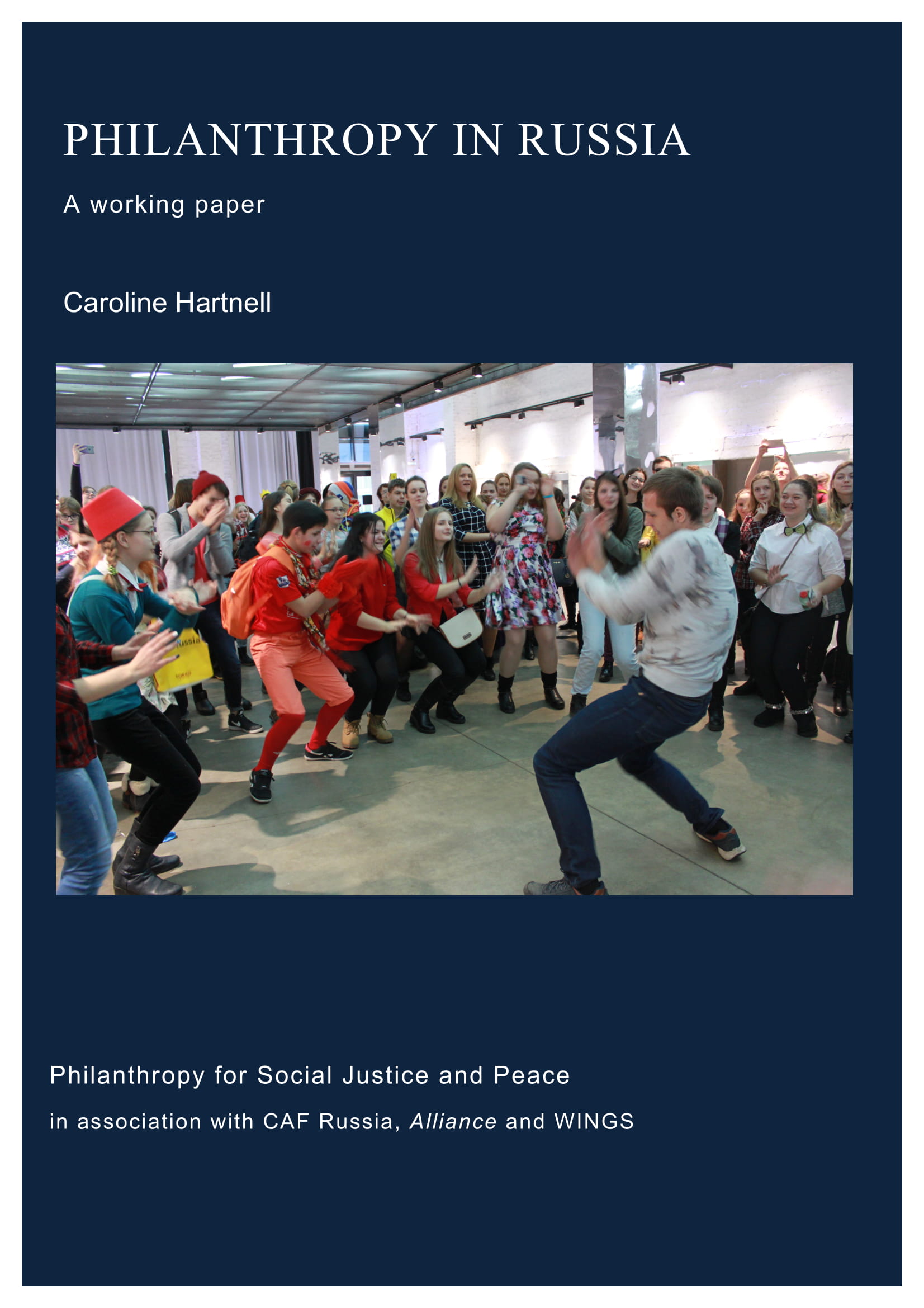We at CAF Russia are very happy to co-publish our report on philanthropy in Russia together with Philanthropy for Social Justice and Peace (PSJP) and WINGS. We have always strongly believed in the value of benchmarking our work in Russia against the global context. This report, written by Caroline Hartnell, gives us this rare opportunity.
 Given the growing isolation of Russia in general and the philanthropic sector in particular, it is important to use every chance to reconnect with developments outside Russia and to raise awareness among the global philanthropic community of the rapid, complex and very exciting progress that Russia’s philanthropy and giving culture is experiencing.
Given the growing isolation of Russia in general and the philanthropic sector in particular, it is important to use every chance to reconnect with developments outside Russia and to raise awareness among the global philanthropic community of the rapid, complex and very exciting progress that Russia’s philanthropy and giving culture is experiencing.
I am happy that this new report gives a reference that helps us to reflect on this process.
I would like to reiterate some overarching themes that the report raises and that in my view determine the current state of Russian philanthropy in a broader sense.
Philanthropy and the state
The report rightly highlights relations between the state and the philanthropic sector as one of the key frames for the story of Russian philanthropy. Indeed, as in many other aspects of Russian life, the state plays an important role vis-à-vis philanthropy and civil society which goes way beyond regulation and legislation.
The state actively shapes the narrative using both sticks and carrots. The Law on Foreign Agents is one major stick which has alienated and even put out of business dozens of human rights, gender and environmental NGOs and some others.
At the same time state funding in the form of Presidential Grants has recently become a major funding stream to the sector. Not only have they provided funding to a large variety of NGOs on a fair and competitive basis. They also influence the judgements of other donors, who now regard their recipients as “worthy”, and they play a role of “protection letter” for their recipients against any attempts to label them “foreign agents”.
The role of the Foundation for Presidential Grants will most probably grow, and it is nothing but a blessing for the sector that the Foundation is led by people who have profound experience in grantmaking and enough political weight to protect its fair process from undue influences and corruption.
Another angle for looking at state-philanthropy relations is the question of whether philanthropy should replace government in its social protection role.
Healthcare, where many fundraising foundations are active, is a great example. On the one hand, public charities see their mission as helping people to get access to much-needed surgery and other kinds of life-saving treatment and funding it with their donors’ money. On the other, the government claims that charities should not interfere as the state budget covers most of the needs.
This dilemma is very central to the work of many charities, and reveals the reason why charities drift from direct assistance to advocacy and other system change work. At the same time it is obvious that the best strategy in the majority of cases is to build partnerships with the government around specific issues and use the resultant goodwill to achieve change.
Charities will always be a drop in the bucket vis-à-vis the state in Russia, but there are enough success stories of such partnerships already (and some of them are mentioned in the report) to give evidence that charities’ advocacy may indeed lead to profound reforms in the system.
Progressive versus traditional philanthropy
Progressive versus traditional philanthropy is another interesting lens to use for better understanding Russian philanthropy. The report states that in all sectors of the philanthropic space the traditional side prevails. It is of course true but it is not the whole truth.
Indeed, for historical and political reasons Russian philanthropy mostly focuses on education, healthcare, support to vulnerable groups, culture, etc. In this it does not differ from the rest of the world where progressive causes such as human rights, gender issues, etc are always in a minority.
Still I would argue that in the Russian context, where paternalistic attitudes are very widespread and most of the channels for democratic participation are blocked, any form of giving is a form of civic activism and agency, no matter what causes it supports.
In addition, we do see that unpopular causes such as environment, human rights and anti-corruption are gaining more traction among the general public, and more people contribute to them than ever before. Up until this moment organizations in the business of growing giving like CAF have been mostly focused on getting people into this space, without much focus on what exactly they support – participation has been what mattered.
Now that the levels of giving have reached a certain point (roughly half of the population give to charity), the sector can afford to promote a more thoughtful approach to giving, including regular donations, supporting the day-to-day work of NGOs as opposed to projects and addressing people’s individual needs, the importance of less popular causes, etc.
As far as institutional philanthropy is concerned, the report duly notices that the progressive element is mostly associated with how things are done rather than what causes are supported. I seriously don’t expect companies or private foundations to switch to supporting a rights agenda in the current political climate.
Still, growing the level of transparency of their giving, developing feedback loops, partnering with NGOs that have relevant expertise, supporting sector infrastructure and NGOs’ core costs, funding community-based initiatives in remote areas rather than elitist undertakings in capital cities – all this make donors’ work a lot more progressive even when they support arts or higher education.
Why does individual giving keep growing?
Mistrust in NGOs would be the most popular answer to the question about obstacles for growing giving in Russia. Russian society overall demonstrates a very low level of trust in any kind of institution, and NGOs are not (relatively) worse off than the police or the church, for instance. Still, there is no sufficient explanation of how, in this context of low trust, individual giving keeps growing. I believe the situation is rather simple.
People may not trust NGOs in general and in fact may have very little idea of what NGOs are and how they are different from other institutions. Still the level of awareness of certain charities and issues has risen to the extent that people feel motivated and confident giving to them. This is a very serious sign of the success of the advocacy communication of many different charities, which has created a solid foundation for growing individual giving in Russia.
A very recent campaign against “scum” charities engaged in street cash fundraising, which is led by a broad coalition of NGOs, is another sign that the sector is not prepared to give up this success and would collectively fight to protect the trust they have won.
A generational shift in leadership
The picture, although inevitably patchy and incomplete, needs another stroke that is somewhat missing in Hartnell’s report. I am talking about the generational shift in leadership. In the last five years the sector has seen a very strong inflow of new people who have left their careers in business, media or the public sector to work in philanthropy.
These people have no baggage, no experience of failure; they are fast and often digitally minded and they tend to reinvent the wheel because they have never seen wheels before. The “older” generation of people who made the sector their life choice when philanthropy was still a marginal vocation often claim that these new people and institutions operate under different values, that they lack moral high ground, reference and understanding.
At the same time, these new people are the ones who are successful in reaching out to younger audiences and raising funds for causes that are considered unpopular. This tension between generations and styles may be unnerving on a personal level, but I believe there is a great value in disruption and the challenge it provides.
Any philanthropic sector should be disrupted and challenged, the Russian one included.
I am very much looking forward to more comments on this report from Russian and international readers.
Maria Chertok is director of CAF Russia. She is the Chair of WINGS (World Initiative for Grant-makers Support), member of the Editorial Board of Alliance magazine and a co-organiser of the Olga Alexeeva Memorial Prize.






Comments (0)